NNCO Quarterly Newsletter: Summer 2021 Edition
|
|
| WHAT’S BIG IN SMALL SCIENCE? A Quarterly Newsletter of the National Nanotechnology Coordination Office (NNCO) |
|
DIRECTOR’S CORNER
Many NNCO activities include advice and professional development for students, including the NextTech Student Network webinar series, and I try to ask each of our podcast guests to share the advice they have, too. As my town readies for “move-in weekend” at the nearby university and there is a bustle to get last-minute supplies at the local stores, I have some advice for students as they approach the new school year. Roll with it. Okay, anyone who knows me realizes this is far from my normal state of being, but I do try to concentrate on what I can control. There are remaining uncertainties as we continue through this global pandemic, but we have learned a lot in the past year and a half. As much as I hope to be mingling with you all at upcoming events, if I have to join you virtually, I know we can still have productive and meaningful discussions that continue to advance and support the nanotechnology community. Please keep an eye on Nano.gov for news and announcements and more information about upcoming events, and don’t hesitate to reach out to share your highlights. And to all the students, we welcome you to participate in the NextTech Student Network and wish you a healthy and productive school year! |
|
NEWS FROM NNI AGENCIES On July 12, NSF announced new Partnerships for Research and Education in Materials (PREM) awards to support materials research partnerships between minority-serving institutions and large-scale, NSF-supported research facilities, with the goal of increasing diversity in cutting-edge materials research and education and materials science and engineering professions. At least two of the partnerships (NSF PREM for Fostering the Next Generation of Nanofiber Systems and Student Success and NSF PREM for Hybrid Nanoscale Systems) will fund nanotechnology-related research. Better conductors are required to electrify the transportation, building, and industrial sectors, alongside the seamless integration of vastly more renewable energy and storage solutions with the national power grid. Incorporating nanomaterials such as graphene and carbon nanotubes into conductors offers the potential for next-generation cables with improved conductivity. DOE’s Conductivity-enhanced materials for Affordable, Breakthrough Leapfrog Electric and thermal applications (CABLE) Conductor Manufacturing Prize—a three-stage, three-year competition—is on a fast-track to find new, efficient, low-cost conductors by incentivizing U.S. manufacturers, researchers, and innovators with a total of $4.5 million in cash prizes. The CABLE Prize just received a number of applications for Stage 1 and will announce the winning concepts in the coming months. Following the announcement, Stage 2 of the prize will open and invite new competitors to join the challenge. NNI agencies continue to use their authorities to support innovators that are using nanotechnology to address the COVID-19 pandemic. Leveraging decades of investments in nanotechnology research, the community has responded with the development of vaccines and other prophylactics, diagnostics and surveillance tools, therapeutics, disinfectants and coatings, and personal protective equipment (PPE) to better protect lives. Of particular note, on Aug. 23, 2021, FDA granted full approval to the first COVID-19 vaccine. The vaccine was developed by Pfizer-BioNTech and uses lipid nanoparticles to deliver mRNA to cells. As we’ve reported in previous newsletters, several of the other vaccines also incorporate nanotechnology. Additionally, many COVID-19 diagnostic tests that have received emergency use authorization from FDA are enabled by nanotechnology (quantum dots, gold nanoparticles, magnetic nanoparticles, etc.) and have been funded by the Federal Government. The following examples highlight recent nanotechnology research advances: Novel self-healing materials developed for testing on the International Space Station (funded in part by DOD and NASA); Nanoparticles create heat from light to manipulate electrical activity in neurons (funded by NIH and DOD); “Magic-angle” trilayer graphene may be a rare, magnet-proof superconductor (funded by DOE and NSF); Scientists create world’s thinnest magnet (funded in part by DOE); A noninvasive test to detect cancer cells and pinpoint their location (funded by NIH); Plant patch enables continuous monitoring for crop diseases (funded by USDA and NSF); New microchip sensor measures stress hormones from drop of blood (funded by DOD); Electrodes that flow to fit the body (funded by NIH and NSF); Ultralight material withstands supersonic microparticle impacts (funded by DOD); Graphene ‘camera’ captures real-time electrical activity of beating heart (funded by NIH, DOE, and NSF); Genetically engineered nanoparticle delivers dexamethasone directly to inflamed lungs (funded by DOD and NIH); Scientists discover how oxygen loss saps a lithium-ion battery’s voltage (funded by DOE); Nanoscale sensors measure elusive water levels in leaves (funded by NIH, USDA, DOD, and NSF); Researchers see atoms at record resolution (funded by NSF). |
|
NANOTECHNOLOGY COMMERCIALIZATION Commercialization of nanotechnology-enabled products continues to advance, with several recent announcements from companies across the country. A company located in San Jose, CA, has been awarded a contract by NIH under the Rapid Acceleration of Diagnostics (RADx) Tech fast-track program. The company leverages patented nanotechnology innovations for rapid COVID-19 diagnostics. A Milpitas, CA, company announced the installation of nanotechnology-enabled smart windows in a 40-story office tower in New York City. In addition to offering energy savings, a university study found that employees in offices with smart windows had fewer headaches, reduced eye strain, and less drowsiness than offices with traditional windows. A company based in Wilmington, DE, has been working to incorporate graphene into the structure of swimming pools, creating a new patent-pending construction process for fiberglass pools. Another company, located in San Diego, CA, has entered into an exclusive license agreement with the Mayo Clinic for a technology platform that is an antibody-drug-nanoparticle complex targeting many types of human diseases including various solid and liquid tumors. |
|
NANOTECHNOLOGY ENVIRONMENTAL, HEALTH, AND SAFETY (nanoEHS) IMPLICATIONS The next webinar, What We Know About NanoEHS: Nanomaterial Measurement Infrastructure, will take place on Sept. 22. A panel including Jo Anne Shatkin (Vireo Advisors), Jeff Gilman (LAMTEC), Vince Hackley (NIST), and Wendel Wohlleben (BASF) will share perspectives on this cross-cutting area of nanoEHS research. More information on the webinar will be posted at https://www.nano.gov/PublicWebinars, as details are finalized. |
|
STEM EDUCATION
The NextTech Student Network is an active and growing network of undergraduate student clubs and organizations with a focus on nanotechnology and other emerging technologies. Last school year, the network facilitated communication and collaboration among NextTech clubs around the country and launched a network-wide webinar series. NextTech will kick off the fall semester with a new installment of the webinar series. Archived webinars from the past series can be found here. K–12 teachers: There is a vast array of classroom-ready nanotechnology resources, including NanoHub and resources for educators from NNCI. For more information about resources, please contact nanoed@nnco.nano.gov. If you are interested in free brochures for your classroom, please contact us. |
|
NANOTECHNOLOGY AND YOU Every week, NNCO releases an episode from one of three podcast series, which consist of interviews between NNCO Director Lisa Friedersdorf and experts from the NNI community. Recently released podcast episodes are listed below: Stories from the NNI episodes are conversations with experts from the NNI community who share their perspective on advances that have been made and future prospects for nanotechnology. Recent episodes feature Jim Schuck (Columbia University), Himanshu Jain (Lehigh University), Clarice Aiello (UCLA), John Weisenfeld (Pasco High School, Pasco, WA), Adam Rondinone (Los Alamos National Laboratory), and Vinayak Dravid (Northwestern University). Nano Matters episodes explore specific nanotechnology topics for a broad audience. Recent episodes feature Dan Roxbury (University of Rhode Island), Heather Clark (Northeastern University), David Muller (Cornell University), Scott VanEpps (University of Michigan), and Pamela Bjorkman (Caltech). Nano Entrepreneurship Network (NEN) podcast episodes highlight best practices, resources, and advice from nanotechnology entrepreneurs and those who support them. A recent episode features Jeff Draa, CEO and co-founder of Grolltex. NNCO hosted a public webinar, Nanosensors for Food and Agriculture, on June 2. The webinar featured Evangelyn Alocilja (Michigan State University), Jonathan Claussen (Iowa State University), Sam Nugen (Cornell University), and Michael Strano (Massachusetts Institute of Technology) and was moderated by Hongda Chen (USDA/NIFA). The panelists shared their visions for how the development and deployment of nanosensors could transform agriculture and food safety. They highlighted the state of the science, discussed technical needs, and explored the challenges associated with bringing these technologies to market. A recording of the webinar is available here. |
|
On June 2, 3, and 7, NNCO Director Lisa Friedersdorf participated in a Stanford SystemX Alliance workshop on Future Directions of Semiconductor Technology—From Atoms to Applications. The goal of the workshop was to provide perspectives and viewpoints on what the future of semiconductor technology may look like. On Aug. 3, Friedersdorf participated in the 2021 NNCI Research Experience for Undergraduates (REU) Convocation. REU programs consist of an intensive 10-week summer research experience for undergraduate students, held at a university different than their own. The convocation is an end-of-program technical conference in which the students present their research results. On Aug. 3, Friedersdorf and NNCO Deputy Director Stacey Standridge hosted a virtual booth at NextFlex Public Innovation Days 2021. The theme of this year’s event was “Next Generation Electronics: Solving Real World Problems.” |
|
UPCOMING EVENTS Sept. 25–26, 2021 Oct. 9, 2021 Oct. 18–20, 2021 Dec. 7–8, 2021 |
|
www.nano.gov | info@nnco.nano.gov Click here to subscribe to our newsletter. |



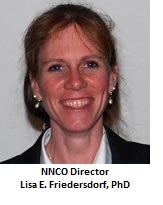 As we swiftly approach the end of summer, I am once again amazed at how fast the time has gone. At NNCO, we have been very busy working with the NNI agencies to complete the 2021 Strategic Plan and our annual report to Congress, and look forward to releasing these important documents in the coming weeks. Preparations are underway to celebrate
As we swiftly approach the end of summer, I am once again amazed at how fast the time has gone. At NNCO, we have been very busy working with the NNI agencies to complete the 2021 Strategic Plan and our annual report to Congress, and look forward to releasing these important documents in the coming weeks. Preparations are underway to celebrate  NIOSH released the draft document,
NIOSH released the draft document,  A new episode from the
A new episode from the 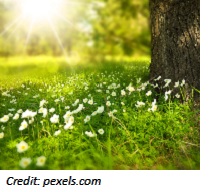 The 2021 NanoEHS webinar series continues to focus on raising awareness of the state of the science and advancements in understanding EHS behavior of nanomaterials in the 10 years since the publication of the
The 2021 NanoEHS webinar series continues to focus on raising awareness of the state of the science and advancements in understanding EHS behavior of nanomaterials in the 10 years since the publication of the 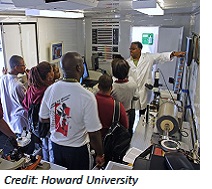 The
The 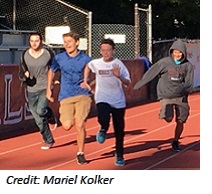 Celebrate
Celebrate 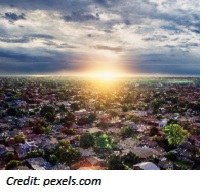 On May 19–28, NNCO contract staff member Maria Fernanda Campa participated in the European Scientific Institute (ESI)
On May 19–28, NNCO contract staff member Maria Fernanda Campa participated in the European Scientific Institute (ESI)  Sept. 22, 2021
Sept. 22, 2021

